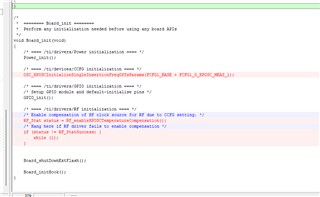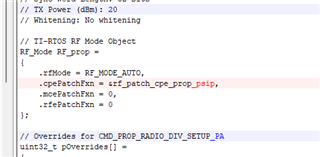Other Parts Discussed in Thread: CC1312R, CC1310, , SYSCONFIG,
Tool/software:
Hi,
I am moving projects from CC1312R and CC1310 to CC1312PSIP. Most of it already working, except for radio communication. I don't know how to control DIO0 and DIO3 outputs.
Currently for CC1312 we are using SDK 4.10.0.78 and 3.40.0.02. For CC1310 4.10.1.01 and 3.20.0.23. The transition to newer SDK is very problematic for us.
Best regards,




